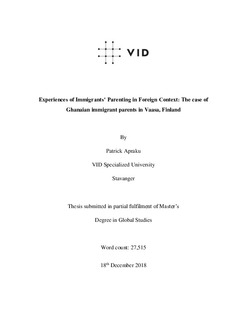| dc.description.abstract | The aim of the study is to explore the experiences of immigrant parents concerning parenting in foreign contexts from the perspective of Ghanaian immigrants in Vaasa, Finland. To achieve this, the study explores how immigrants adapt to the new parenting culture and the feelings attached to the changes that occurred. Further, the study investigates how immigrants communicate with their children and the child welfare services as well as the coping mechanisms these immigrants employ to address the negative feelings and challenges encountered to ensure parental functioning.
The study employed qualitative research approach using ethnographic data collection methods such as personal observation, focus group discussion and interviews to acquire qualitative data from ten Ghanaian immigrant parents.
Findings indicate immigrant parents adapt to the new parenting culture by choosing parenting practices, which according to their understanding are very important from both their old and the new cultures in bringing up their children. All the participants said they pick from their old culture those practices that did not contradict the laws of their new (host) culture to get a sense of balance.
Some studies describe family lives in the Nordic region as being cold and a living nightmare for families. Nevertheless, the present study found Ghanaian immigrant parents had developed new ways of communicating with their children. Fathers (parent) who experienced unpleasant relationships with their parents in their old cultures have nonetheless developed special bond with their children due to integration in the new cultural system. However, the findings confirmed other literature findings that immigrant parents encounter some frustrations and stressful moments in parenting in new cultures. Nonetheless, the participants preferred to cope by seeking help from family back home, friends and from the internet with no or little involvement of the professionally trained family and child welfare services in the host or new culture. Only few participants for example had ever called to receive guidelines for parenting on phone. Irrespective, all participants said they believed in the positive outcomes of raising their children in the new culture, provided they could balance the two cultures accordingly. Their feeling of success gave those positive emotions that could help them cope with frustration and stressful moments (negative emotions) they encountered as parents in the new culture.
Based on the research findings, it was concluded that communication in an intercultural or foreign environment plays an important role in immigrant parental experiences and influence their acculturation to the new parenting culture. Failure in communication on the other hand, explained why majority of the participants did not want to involve the child welfare services in their parenting problems, as well as fostering certain negative emotions. Therefore, measures to ensure effective communication between immigrant parents and the host parenting culture was considered very important in bringing the immigrants close to understanding the host or new culture. This fosters their integration and consequently neutralizing the associated negative motions. | nb_NO |
